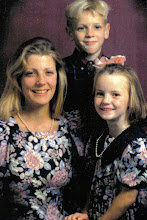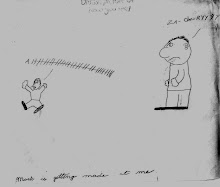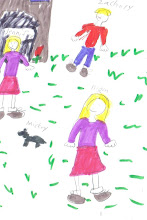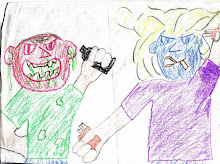By Barry Nolan
January 11 2009
This is really hard to believe. I am sitting in a room filled with women who were beaten, and violated in terrible ways. The room is not in Bosnia, or some far flung third-world hell-hole. I am in a function room in a hotel in Albany at the Battered Mothers Custody Conference.
 Many of the women around me are sobbing now, as a child tells her story. “My father beat me” she begins. Well, she is not a child now actually, but she is a child to me. She is a poised, attractive young woman named Jennifer Collins who is a survivor of child abuse and of a Child and Family Court System that betrayed her and her brother, just as it betrays children across this country every day when it orders children to live full time with an abusive parent.
Many of the women around me are sobbing now, as a child tells her story. “My father beat me” she begins. Well, she is not a child now actually, but she is a child to me. She is a poised, attractive young woman named Jennifer Collins who is a survivor of child abuse and of a Child and Family Court System that betrayed her and her brother, just as it betrays children across this country every day when it orders children to live full time with an abusive parent.I know you do not believe me. And that makes me realize that this is the experience that these women who surround me have all had. No one believes them. No one believes this can happen. But it does. Sometimes this happens despite voluminous evidence, eyewitnesses and medical records that the child has been beaten, even raped and sodomized by a parent seeking custody. Sometimes the courts do this even if the parent seeking custody has been convicted of, or admitted to domestic violence or sexual assault. I know you don’t believe me. But you would believe Jennifer if you were here.
It is a strange world in Child and Family court. For instance, even as much energy in the wider world goes into efforts to make certain that sex offenders have no access to children, that they can’t live near a school and walk near a playground, in this odd little corner of our judicial system, courts routinely order children to “reunite” with a sexual predator parent who hurt them. All in the name of “family re-unification”.

I know this sounds impossible. It is against all common sense. This is America after all. But come sit here with me, and listen to this woman/child tell her story. She has “aged out” of the system and is no longer under the thumb of a court that tells her she must be silent. There is a whole group of courageous kids like Jennifer who are old enough now to tell their story to you, face to face. Jennifer’s story is a pip. And it is pretty typical.
Jennifer tells us about her mother Holly and her dad. He was a batterer who beat Holly. And he beat the children. Jennifer moves her story along quickly to the day when her older brother, then about 4, tried to intervene as dad was beating mom. Dad threw the son against the wall and fractured his skull. There is much more. But I will move the story along quickly to what happens when Holly finally decided to leave this man who beat her and the children. She fled that terrible house, only to find herself in house of mirrors. The Child and Family Court system.
It is almost as if none of the people who run the Child and Family Court system ever read about or learned a single thing from sad saga of the Catholic Church’s sexual abuse scandal. It’s like they never heard about how victims of physical or sexual abuse are often silenced by their own sense of shame. How their terrible stories can sometimes finally come pouring out in torrents. It may be years later, but it is no less true. This is not theory. This is fact. We have all watched these sad dramas on the 6 O’clock news.
But, uniquely in Child and Family Court, if allegations of physical or sexual abuse are raised during a divorce where custody is an issue, the allegations are used, not against the perpetrator, but against the victim. There is this invented thing, a bit of junk science called “Parental Alienation Syndrome”. It basically says that any time a woman raises the issue of physical or sexual abuse, of herself or the children in the midst of a custody dispute, she is just trying to make the man look bad and make the children hate him. She must be lying.
 Look, I am not a fool. I know people lie. I know some women lie. I know people say awful things about each other in divorces. I have watched Jerry Springer just like you. But I have also watched “To Catch a Predator” and I know “respectable” people can do horrible things. So, do a thought experiment here. Pretend you are a woman who had finally left an abusive relationship, taking your children with you. If your controlling soon-to-be ex-husband sought to get full custody of the children as one last slap at you, what would you say? OK? Sure, that sounds fair? Fat chance.
Look, I am not a fool. I know people lie. I know some women lie. I know people say awful things about each other in divorces. I have watched Jerry Springer just like you. But I have also watched “To Catch a Predator” and I know “respectable” people can do horrible things. So, do a thought experiment here. Pretend you are a woman who had finally left an abusive relationship, taking your children with you. If your controlling soon-to-be ex-husband sought to get full custody of the children as one last slap at you, what would you say? OK? Sure, that sounds fair? Fat chance.The thing a real court would do when this happened is to consider all the evidence, and talk to all the witnesses. Witnesses like the children. They were after all, there when “it” happened. This is what a court would do if a stranger were accused of beating them. Or raping them. But this is not what the Child and Family Court system does.
Jennifer, the survivor, tells us of the day the representative of the court came to take her away from her mother and take her to live at her dad’s. How she clung desperately to her mother’s leg, until they pried her fingers loose, lifted her up, carried her away, and compelled her to live with the man who would beat her. Jennifer tells us how her mother, desperate beyond all measure, kidnapped the children, spirited them away to the Netherlands, where they became the first Americans to be granted asylum. How she lived in a refugee camp, with refugees from Somalia and Sierra Leone, people who had to learn how to use toilets and forks. How this was better than “home”. This was a step up. She was with her mom.
Jennifer lived in exile for 14 years. She finally “aged out”. The court has no jurisdiction now. And so Jennifer had the freedom to come home, to America, to this room where I sit, surrounded by women who are now weeping with joy and cheering for Jennifer’s mom for being so brave and for Jennifer for telling her story to this room full of people who know her story is true. Because the same thing happened to them. So they believe her.
I believe her, too.
----
Snarling up the wrong tree there fella
by Barry Nolan - 01/16/2009
Dear (commenter)
If you but give the article I wrote a cursory glance, you will actually find that none of the things you attacked it for are in the article. I think you are right that doing your homework is indeed a thing of value. So are reading skills. I am glad we agree on something. In fact my homework has consisted of reading court transcripts, medical records, case histories, talking to lawyers, judges and eyewitnesses. The issue is not about some kind of "quota" system that will insure that 50% of all custody is awarded to men, but about seeing to it that children are never ordered to live with a parent who will abuse them. Male or female. If you have a problem with that, then we disagree.
As to your assertion that mothers are given custody in 90% of the cases - perhaps this is true, if the pool you are measuring is all of the run of the mill divorce cases. You may have noticed in this country, the women tend to be the primary caregivers, maybe that has something to do with it. But in cases where there have been credible allegations of domestic violence, child abuse and sexual abuse, studies have shown far different results. And your assertion that "not even the best of fathers can gain custody" is simply not credible, even using your own statistics.
You point out people who have supported the agenda of the Battered Womens Custody Conference that have had some "issues" of their own. Somehow you overlooked mentioning cases like that of Kenneth John Freeman (please Google him yourself) who not only sexually abused his child, He videotaped it and distributed it on the Web. He recently pled guilty and received a sentence of 50 years. He was a guy who really wanted "custody."
But that does not make any other men guilty, just as your anecdotes do not make any other women out to be liars. What my article called for is, when there are credible allegations of child abuse, sexual abuse or domestic violence, for courts to look at that evidence, hear the witnesses, talk to the children. If you have a problem with that form of simple straightforward justice, then we have found something we disagree on. Profoundly.










